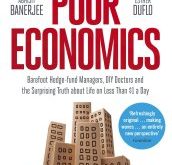from Lars Syll Few volumes in contemporary economics have been more lauded, and have summarised a zeitgeist, as much as Abhijit Banerjee and Esther Duflo’s Poor Economics … The implicit premise of the book is that interventions that work in one place can be expected to work in another. This presumes not only that the results of such “micro” interventions are substantially independent of the “macro” context, but also that a focus on such interventions, as opposed to those which reshape...
Read More »Yes folks, Omicron can be blamed on patent monopolies
from Dean Baker The development of the new variant, which was first discovered in South Africa, can be attributed to our failure to open-source our vaccines and freely transfer technology, contrary to claims from the pharmaceutical industry and its political allies. Their big talking point is that South Africa currently has more vaccines than it can effectively use at the moment. This claim ignores two important points. The first is that we really don’t know where this strain originated....
Read More »More quotes against economics
from Asad Zaman A previous post Quotes Critical of Economics collected assorted quotes which are useful in writing up different kinds of critiques of economics. In addition, I collected quotes from Romer’s Trouble With Macro which are sharply critical of economics. In terms of the “Loyalty, Voice, Exit” paradigm, I look for “Exit” quotes, which suggest that we need to throw out the entire discipline and rebuild on new foundations; for a proposed alternative, see “Uloom-ul-Umran: An...
Read More »Neoliberalism’s conception of economic reality as . . .
from Lukas Bäuerle and PNLE The most powerful and at the same time dangerous aspect of neoliberal thought is its conception of economic reality as governed by a separate sphere of absolute truths. In aligning with a long-standing tradition of perennial philosophies (lat. perennis: constant, lasting), neoliberalism has set out to reconfigure our world according to an image that was dead from the very outset. The myth neoliberalism is operating on philosophically is the idea of a world...
Read More »Amazon is not identical with your corner shop.
from Gerald Holtham (originally a comment) Radford’s points are true but the microfoundations movement in macroeconomics is guilty of greater intellectual crimes than merely attempted reductionism. It is not as if the foundations are built on extensive empirical study of the decision-making elements in an economy. We have a representative consumer who behaves according to the axioms of rational choice under conditions of certainty equivalence. Similarly there is a representative firm...
Read More »Mainstream economics — a harmful fantasy
from Lars Syll Anyone who accepts the Neoclassical definition of ‘rational’ has, to some significant degree, lost touch with reality. So, I was expecting an ‘irrational’ reaction from this young zealot to my talk … He tried to engage me in further debate after the session, and shouted ‘But we have to make some simplifying assumptions!’ at me as I left the seminar room. My riposte, cast over my receding shoulder, was ‘Mate, you have to learn the difference between a simplifying assumption...
Read More »More is different: a redux
from Peter Radford “Formation is the vanishing of being into nothing, and the vanishing of nothing into being” Hegel loved his dialectics. But it isn’t just contrasts that illuminate reality. It is connections also. Connections matter. Single things are interesting. Perhaps even intriguing. But it is the way in which things connect that leads us to the better understanding of our surroundings and of ourselves. Our modern world rests largely on a web of technology that mediates our...
Read More »New WEA book
Kindle $8.00US UK DE FR ES IT NL JP BR CA MX AU IN Paperback $22.00US UK DE FR ES IT JP CA Contributors: Richard Parker, Richard B. Norgaard, James K. Galbraith, Lukas Bäuerle, William E. Rees, Jayati Ghosh, Richard C. Koo, Neva Goodwin, Max Koch, Jayeon Lindellee, Johanna Alkan Olsson, Katharine N. Farrell, John Komlos, Clive L. Spash, Adrien O.T. Guisan, Andri W. Stahel, Jamie Morgan, Edward Fullbrook If you feel that there is nothing new or liberal about neoliberal economics, and...
Read More »In fighting COVID-19, intellectual property, not antitrust, is the real problem
from Dean Baker Former New York Times reporter Donald McNeil had an interesting Medium piece on how antitrust law could be impeding the development of effective treatments for COVID-19. McNeil argued that COVID-19 treatments that were developed by Pfizer and Merck, and are now in the final stages of testing, may work best when taken together. He argues that this may be the case because the drugs use two fundamentally different mechanisms for attacking the virus. By using the two in...
Read More »Rational expectations — the triumph of ideology over science
from Lars Syll For more than 20 years, economists were enthralled by so-called “rational expectations” models which assumed that all participants have the same (if not perfect) information and act perfectly rationally, that markets are perfectly efficient, that unemployment never exists (except when caused by greedy unions or government minimum wages), and where there is never any credit rationing. That such models prevailed, especially in America’s graduate schools, despite evidence to...
Read More » Real-World Economics Review
Real-World Economics Review




